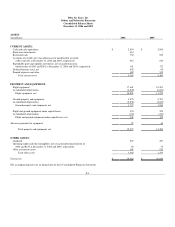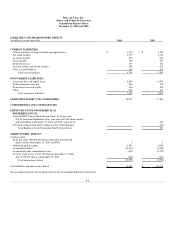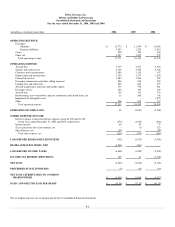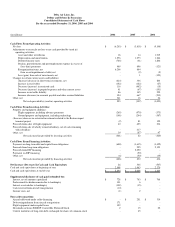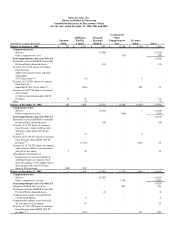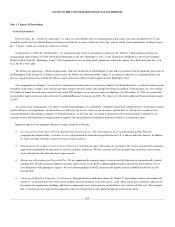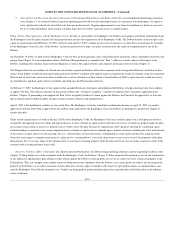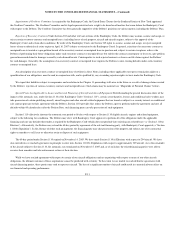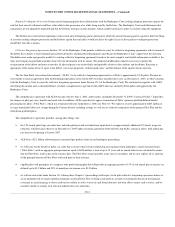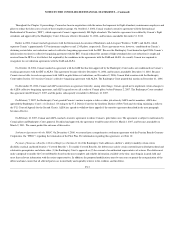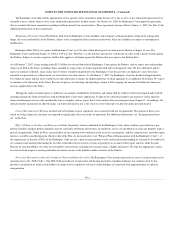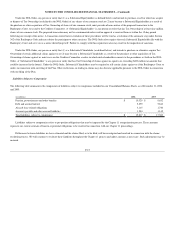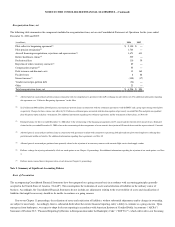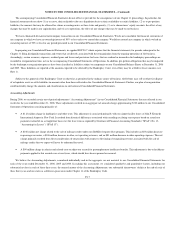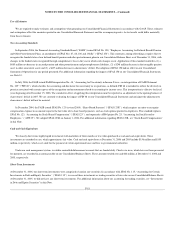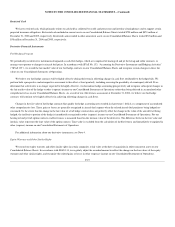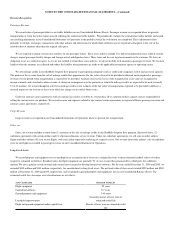Delta Airlines 2006 Annual Report Download - page 70
Download and view the complete annual report
Please find page 70 of the 2006 Delta Airlines annual report below. You can navigate through the pages in the report by either clicking on the pages listed below, or by using the keyword search tool below to find specific information within the annual report.
NOTES TO THE CONSOLIDATED FINANCIAL STATEMENTS – (Continued)
Request for Adequate Protection.Certain aircraft financing parties have filed motions with the Bankruptcy Court seeking adequate protection against the
risk that their aircraft collateral could lose value while in the possession of or while being used by the Debtors. The Bankruptcy Court could determine that
such parties are not adequately protected and that the Debtors must pay certain amounts, which could be material, in order to continue using the equipment.
The Debtors have entered into stipulations with several aircraft financing parties pursuant to which the aircraft financing parties agreed to defer the filing
of a motion seeking adequate protection and the Debtors agreed that such delay would not affect the right (if any) of these parties to adequate protection
should they later file a motion.
Collective Bargaining Agreements.Section 1113 of the Bankruptcy Code permits a debtor to reject its collective bargaining agreements with its unions if
the debtor first satisfies several statutorily prescribed substantive and procedural prerequisites and obtains the Bankruptcy Court’s approval of the rejection.
The debtor must make a proposal to modify its existing collective bargaining agreements based on the most complete and reliable information available at the
time, must bargain in good faith and must share relevant information with its unions. The proposed modifications must be necessary to permit the
reorganization of the debtor and must ensure that all affected parties are treated fairly and equitably relative to the creditors and the debtor. Rejection is
appropriate if the unions refuse to agree to the debtor’s necessary proposals “without good cause” and the balance of the equities favors rejection.
The Air Line Pilots Association, International (“ALPA”) is the collective bargaining representative of Delta’s approximately 5,810 pilots. Because we
were unable to reach an agreement with ALPA during negotiations in the fall of 2005 to reduce our pilot labor costs, on November 1, 2005, we filed a motion
with the Bankruptcy Court to reject the collective bargaining agreement under Section 1113 of the Bankruptcy Code. We continued to negotiate with ALPA
after filing this motion and, as described below, reached a comprehensive agreement with ALPA that was ratified by Delta pilots and approved by the
Bankruptcy Court.
The comprehensive agreement with ALPA became effective June 1, 2006, and becomes amendable December 31, 2009 (“Contract Period”). It provides
for changes in pilot pay rates, benefits and work rules. In addition, ALPA agreed not to oppose termination of Delta’s primary qualified defined benefit
pension plan for pilots (“Pilot Plan”), which was terminated effective September 2, 2006 (see Note 10). We expect to receive approximately $280 million in
average annual pilot labor cost savings during the Contract Period, excluding savings we will receive from the termination of the primary Pilot Plan and the
related non-qualified plans.
The comprehensive agreement provides, among other things, that:
•the 14% hourly pilot wage rate reduction, and other pilot pay and cost reductions equivalent to an approximately additional 1% hourly wage rate
reduction, which became effective on December 15, 2005 under an interim agreement between Delta and ALPA, remain in effect, with annual pay
rate increases beginning in January 2007.
•ALPA has a $2.1 billion allowed general, unsecured pre-petition claim in our bankruptcy proceedings.
•we will issue for the benefit of pilots, on a date that is no later than 120 days following our emergence from bankruptcy, senior unsecured notes
(“Pilot Notes”) with an aggregate principal amount equal to $650 million, a term of up to 15 years and an annual interest rate calculated to ensure
that the Pilot Notes trade at par on the issuance date. The Pilot Notes are pre-payable at any time at our option, and we may replace all or a portion
of the principal amount of Pilot Notes with cash prior to their issuance.
•eligible pilots will participate in a company-wide profit-sharing plan that will provide an aggregate payout of 15% of our annual pre-tax income (as
defined) up to $1.5 billion and 20% of annual pre-tax income over $1.5 billion.
•we will not seek relief under Section 1113 during these Chapter 11 proceedings with respect to the pilot collective bargaining agreement unless we
are in imminent risk of our post-petition financing (as described in Note 6) being accelerated on account of an imminent breach of the financial
covenants in such financing, we have used our best efforts to seek a waiver of such breach but have not been able to secure such a waiver, and we
would be unable to remedy such a breach without labor cost reductions.
F-12


